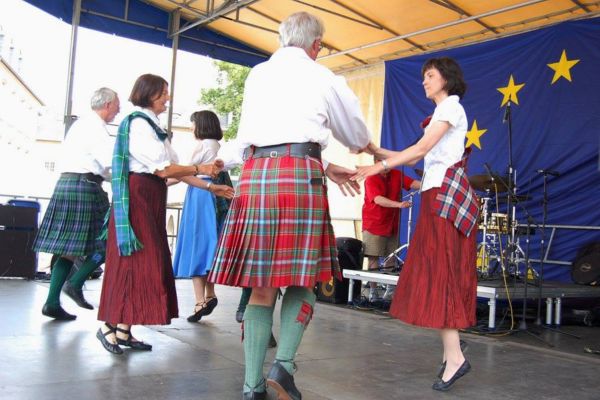 Credit: Luxembourg Scottish Country Dance Club
Credit: Luxembourg Scottish Country Dance Club
The Cercle Culturel des Institutions Européennes (EU Cultural Circle) is the umbrella organisation for around 35 clubs and associations affiliated to the European Institutions in Luxembourg.
From music and theatre to chess and wine, there is a variety of clubs for individuals with different interests. Membership and participation in the clubs’ and associations' activities, is also open to people not working in the European Institutions.
In this series of articles, Chronicle.lu explores some of the different clubs and associations of the Cercle Culturel, including their main activities, interests, membership and events.
Next up is the Luxembourg Scottish Country Dance Club, where Chronicle.lu talked with Ian Drummond, Chairman.
Chronicle.lu: When and why was the club founded, and what are its main goals and objectives?
Ian Drummond: Our club, the Luxembourg Scottish Country Dance Club, was formed in 1974 at the time that the United Kingdom joined the European Community. This also occurred in a number of European countries. Our aim is the promotion of Scottish culture and dancing to both British residents in Luxembourg and other nationalities.
Chronicle.lu: What is the main language of the club and how many nationalities are members of the club?
Ian Drummond: The main language of the club is English. There are eleven nationalities represented by members of the club.
Chronicle.lu: How often do you meet and where?
Ian Drummond: We meet for weekly dances on Tuesdays at the gym hall of the Noppeney school in [Luxembourg]-Kirchberg.
Chronicle.lu: What is your main target audience?
Ian Drummond: We aim to attract people of both British and other nationalities who are interested in Scottish culture and/or country dancing.
Chronicle.lu: How has membership grown over the years and has membership increased since Cercle Culturel began admitting members who are not working in EU institutions? What percentage of your members are not employed by the EU institutions (if known)?
Ian Drummond: Our membership grew until 2021, but receded over the Covid pandemic because dancing in groups like ours had to cease to a great extent. Some 27% of our members are not employed with the EU.
Chronicle.lu: What events are your club planning or participating in during the coming months?
Ian Drummond: We are held our traditional St Andrew’s Ball (Scotland’s patron saint) on 30 November. Our club will also celebrate Burns Night (Scotland’s famous poet) in late January. Then, on 14 June [2025], we will have our 50th Anniversary Ball, celebrating 50 years of the club’s formation.
Chronicle.lu: How can someone who is interested in the club’s activities become a member?
Ian Drummond: People interested in joining the club are invited to come to our weekly dances, primarily at the start of our dance year in September-November, when sessions are geared to introducing dance steps and movements. Initially dancing is free and those who are attracted to the dancing can then join the club as members.
Chronicle.lu: Are there different classes/different levels for beginners through to more experienced members?
Ian Drummond: Weekly dances are generally organised to have an initial session for less experienced dancers, followed by a later session for more experienced dancers.








